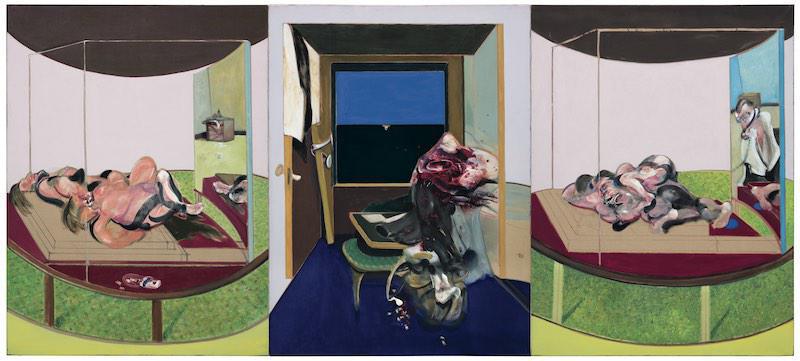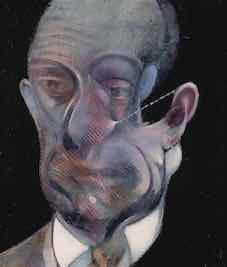The exhibition 'Bacon : Books and Paintings' explores the intensity of deceased painter Francis Bacon's relationship to a certain type of literature.
Triptych inspired by T.S. Eliot's poem, Sweeney Agoniste 1969, oil and pastel on canvas, 198x147,5 cm, Hirschorn Musuem ©The Estate of Francis Bacon

The authors Francis Bacon favoured share a poetic world, but one which distrusts values such as abstract beauty, historical teleology, or deities to focus on an amoral and realistic vision of the world, a concept of art liberated from idealism. Many art lovers have trouble coming to terms with what they perceive as a crude way of depicting human bodies, reduced to washed out and bloody rendering of what Bacon regarded as the essence of human existence, leading to death and destruction.
The painter had confided to famous British art critic David Sylvester who died in 2001 that he only read texts that evoked immediate images to him, a powerful stimulus for his imagination, providing the general atmosphere and inspiration for the stark images that dominate his painting. Known for his harsh figurative, yet abstract rendering of his subjects, often enclosed in geometric cage-like frames within the final frame, Francis Bacon cannot be ignored among the major influences in the art world of last century.
Didier Ottinger, the curator of the show, chose to take the innovative approach of appreciating Bacon's painting while studying his penchant for reading. Authors such as Nietsche, Georges Bataille, T. S. Eliot, Michel Leiris, Joseph Conrad and Greek playwright Eschyle, all provided a somber approach to life and death. The inventory of Francis Bacon's library, undertaken by Trinity College, Dublin, lists more than a thousand works.
The painter had confided to famous British art critic David Sylvester who died in 2001 that he only read texts that evoked immediate images to him, a powerful stimulus for his imagination, providing the general atmosphere and inspiration for the stark images that dominate his painting. Known for his harsh figurative, yet abstract rendering of his subjects, often enclosed in geometric cage-like frames within the final frame, Francis Bacon cannot be ignored among the major influences in the art world of last century.
Didier Ottinger, the curator of the show, chose to take the innovative approach of appreciating Bacon's painting while studying his penchant for reading. Authors such as Nietsche, Georges Bataille, T. S. Eliot, Michel Leiris, Joseph Conrad and Greek playwright Eschyle, all provided a somber approach to life and death. The inventory of Francis Bacon's library, undertaken by Trinity College, Dublin, lists more than a thousand works.
Study for portrait of Michel Leiris, 1978, oil on canvas, 35,5x30?5 cm, donation Louise and Michel Leiris © The Estate of Francis Bacon

The exhibition is the first in France after the retrospective of Francis Bacon at Centre Pompidou in 1996 after the painter's death in April 1992. For a younger generation, it is the chance to become acquainted with Bacon's work and inspiration. 'Bacon : Books and Paintings' will travel onwards to Houston in February, 2020.
Bacon's major exhibition took place in 1971 at the Grand Palais and assured his international acclaim. However it also tragically drove Bacon's young companion, George Dyer, to suicide during the actual exhibition for which the painter felt extremely guilty. Thereafter Bacon's work veered to a yet more somber style of painting, marked by simplification and intensification of his chromatic palette of yellow, pink and saturated orange.
Didier Ottinger introduces visitors throughout the six display rooms, dedicated to Bacon's favourite authors, to the recorded rendering of text excerpts. Mathieu Almaric, Jean-Marc Barr, Carlo Brandt, Valerie Dreville, Hippolyte Girardot, Dominique Reymond and Andre Wilms provide a striking vocal background, during which visitors visually savour over sixty paintings including 12 triptychs, and a series of portraits and self-portraits, as well as studies of the human body, from major public and private collections.
Among his contemporaries, Michel Leiris who translated the painter's interviews by Sylvester into French, was the writer closest to Francis Bacon with whom he even produced a book. Essentially the show focuses on the work produced by Bacon in the last two decades of his career - marked by guilt over the death of his companion - with a proliferation of the symbolic and mythological form of the Furies (Erinyes) such as the Black Triptychs (In Memory of George Dyer, 1971, Triptych August 1972 and Tritych May-June 1973).
Earlier works such as various interpretations of the cruxifixion, his series of the Red Pope, or of the Sphinx representing the myth of Oedipus are also included in the show.
Bacon's major exhibition took place in 1971 at the Grand Palais and assured his international acclaim. However it also tragically drove Bacon's young companion, George Dyer, to suicide during the actual exhibition for which the painter felt extremely guilty. Thereafter Bacon's work veered to a yet more somber style of painting, marked by simplification and intensification of his chromatic palette of yellow, pink and saturated orange.
Didier Ottinger introduces visitors throughout the six display rooms, dedicated to Bacon's favourite authors, to the recorded rendering of text excerpts. Mathieu Almaric, Jean-Marc Barr, Carlo Brandt, Valerie Dreville, Hippolyte Girardot, Dominique Reymond and Andre Wilms provide a striking vocal background, during which visitors visually savour over sixty paintings including 12 triptychs, and a series of portraits and self-portraits, as well as studies of the human body, from major public and private collections.
Among his contemporaries, Michel Leiris who translated the painter's interviews by Sylvester into French, was the writer closest to Francis Bacon with whom he even produced a book. Essentially the show focuses on the work produced by Bacon in the last two decades of his career - marked by guilt over the death of his companion - with a proliferation of the symbolic and mythological form of the Furies (Erinyes) such as the Black Triptychs (In Memory of George Dyer, 1971, Triptych August 1972 and Tritych May-June 1973).
Earlier works such as various interpretations of the cruxifixion, his series of the Red Pope, or of the Sphinx representing the myth of Oedipus are also included in the show.
Oedipus and the Sphinx, after Ingres, 1983, oil on canvas, 198x147,5 cm, Berardo Collection, Lisbon, ©The Estate of Francis Bacon
Beaubourg Centre Pompidou
Place Georges-Pompidou, 75004 Paris
Tél : + 33 1 44 78 12 33.
Access : metro Hôtel de ville and Rambuteau, RER Châtelet-les-Halles.
Opening times : every day from 11 a.m. to 9 p.m., except tuesdays and May 1st. Thursdays open late until 23 p.m.
Admission : €15, reduced price €12 for young people under 26
Free for those under 18
Teachers and students at schools of art, drama, dance and music and members of the Maison des artistes may visit the Museum for free and buy tickets for exhibitions at the concessionary rate.
Free admission for centre pompidou members.
Home printable tickets : centrepompidou.fr
Reservations only : www.billetterie.centrepompidou.fr
Place Georges-Pompidou, 75004 Paris
Tél : + 33 1 44 78 12 33.
Access : metro Hôtel de ville and Rambuteau, RER Châtelet-les-Halles.
Opening times : every day from 11 a.m. to 9 p.m., except tuesdays and May 1st. Thursdays open late until 23 p.m.
Admission : €15, reduced price €12 for young people under 26
Free for those under 18
Teachers and students at schools of art, drama, dance and music and members of the Maison des artistes may visit the Museum for free and buy tickets for exhibitions at the concessionary rate.
Free admission for centre pompidou members.
Home printable tickets : centrepompidou.fr
Reservations only : www.billetterie.centrepompidou.fr
